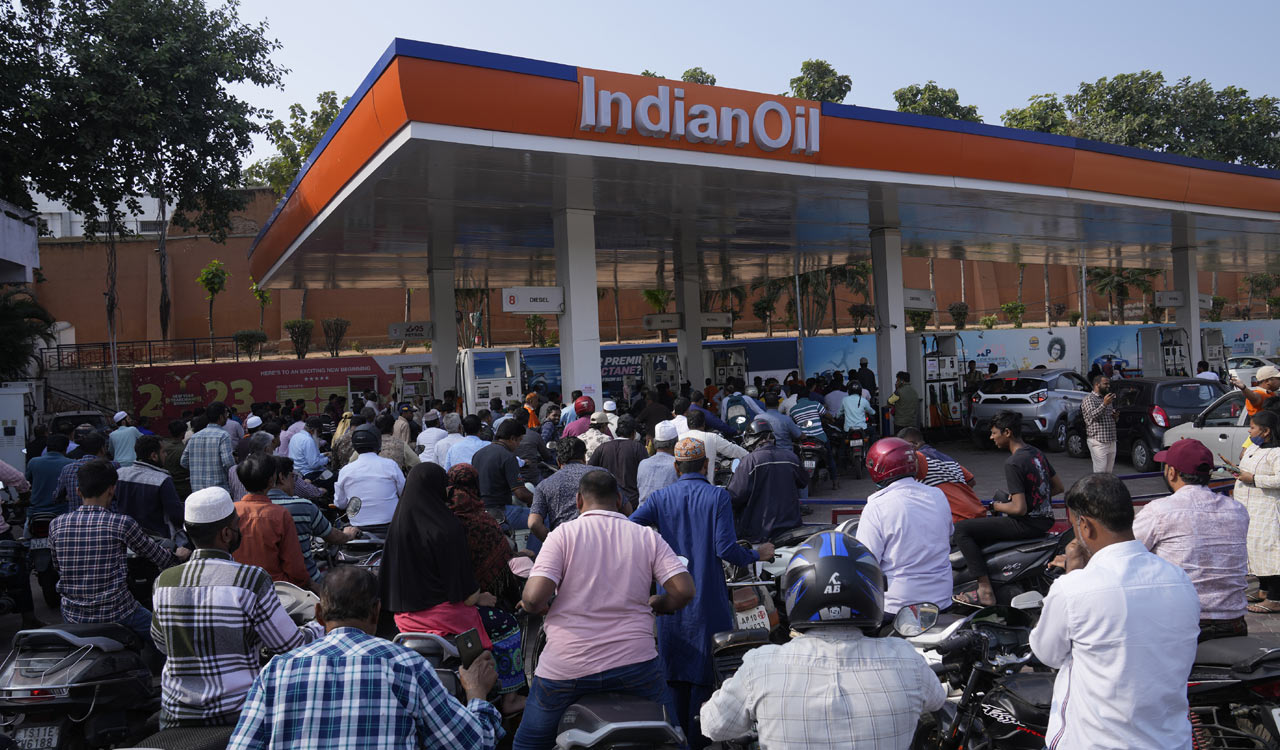
Essential supplies of vegetables, fruits and milk too may get affected if the three-day strike is extended or a pan-India movement is launched
Updated On - 05:56 PM, Tue - 2 January 24
New Delhi: About 2,000 petrol pumps, mostly in western and northern India, have run out of fuel stocks as the strike by some truckers’ associations entered the second day on Tuesday.
While state-owned oil firms had topped up tanks at most petrol pumps across the country in anticipation of the truckers’ strike, some petrol pumps in Rajasthan, Madhya Pradesh, Maharashtra and Punjab ran out of stock due to heavy rush, industry officials said.
Long queues were witnessed at several pumps in these states as panic set in on stocks running out.
Situation in southern India is better with no major supply disruption barring a few pumps in Hyderabad, they said.
Essential supplies of vegetables, fruits and milk too may get affected if the three-day strike is extended or a pan-India movement is launched.
Some truck, bus and tanker operators began a three-day strike on Monday against the stringent jail and fine regulations under the new criminal law Bharatiya Nyay Sanhita (BNS) for hit-and-run cases.
The All India Motor Transport Association — the umbrella body of truck operators — has so far not given a nationwide strike call and its representatives will be meeting home ministry officials to raise their concerns around BNS.
The industry officials said most petrol pumps have stocks to last 2-3 days and should not see any problems if the strike was to last for the stated three days. However, there will be trouble if the strike is extended or a pan-India protest is called, they added.
There are about 1 lakh trucks that ferry petrol and diesel as well as LPG from oil company depots to petrol pumps and gas distribution agencies.
The strike has impacted the movement of trucks in some western and northern states, they said, adding some LPG truck movement too has been impacted.
However, there is no complaints on LPG shortage just yet as most users have double connections (two LPG cylinders) and reserve stock even if one cylinder gets exhausted.
If the strike were to get extended, LPG supplies too may get hit, they said.
In Maharashtra, the state government requested police to ensure an uninterrupted supply of petrol and diesel while commuters in Madhya Pradesh encountered travel inconvenience.
Since Monday, protestors have blockaded roads and highways across states like Gujarat, Rajasthan, Maharashtra and Madhya Pradesh.
The new law, which replaced the colonial-era Indian Penal Code, provides for a jail of up to 10 years and/or a fine of Rs 7 lakh for serious road accidents due to negligent driving and where drivers run away without informing the police.
Truckers said most truck drivers choose to run away even in minor accidents as they otherwise will have to face mob justice and risk of life. While the mobs typically go unpunished, to impose stringent punishment on drivers was unfair, they said.
Long queues at petrol pumps in Himachal Pradesh’s Shimla and Dharamshala were also reported.
Heavy rush was seen outside petrol pumps in Mumbai and Thane as people came to fill up their vehicle tanks fearing shortage of fuel.
Petrol Dealers Association, Mumbai, President Chetan Modi told PTI that the fuel supply to petrol pumps was affected due to the drivers’ agitation since Monday. “Petrol pumps started running dry yesterday. If we don’t get the supply, most of the pumps will run out of fuel by the end of the day,” he said.
Protesters obstructed highways in several districts of Gujarat, including Kheda, Valsad, Gir Somnath, Bharuch, and Mehsana, and in places like Nagpur in Maharashtra by using trucks as blockades on roads.
Tapan Sharma, a former president of the Ahmedabad Motor Transport Association in Gujarat, told PTI that the protests occurred spontaneously. “The association has not called for a strike. Drivers are acting independently due to concerns about the new law. They protest briefly and then move on. However, these sporadic demonstrations have caused delays in the delivery of goods.”





Leave a Reply